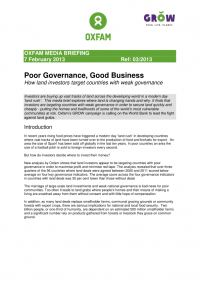Our Vision
Our vision is a just world without poverty. We want a world where people are valued and treated equally, enjoy their rights as full citizens, and can influence decisions affecting their lives.
Our Purpose
Our purpose is to help create lasting solutions to the injustice of poverty. We are part of a global movement for change, empowering people to create a future that is secure, just, and free from poverty.
Achieving our Purpose
We use a combination of rights-based sustainable development programs, public education, campaigns, advocacy, and humanitarian assistance in disasters and conflicts.
We challenge the structural causes of the injustice of poverty, and work with allies and partners locally and globally.
Resources
Displaying 81 - 85 of 128A NEW DAWN FOR EQUITABLE GROWTH IN MYANMAR? Making the private sector work for small - scale agriculture
The new wave of political reforms have set Myanmar on a road to
unprecedented economic expansion, but,
without
targeted policy
efforts and
regulation to
even the playing field, the benefits of new
investment will filter down to only a few,
leaving
small
-
scale farmers
–
the backbone of the Myanmar economy
–
unable
to benefit from
Promises, Power, and Poverty. Corporate land deals and rural women in Africa
Includes the predicaments, concerns and challenges faced by rural women – commercialization of natural resources, how rural women value land, from ‘women’s crops’ to ‘men’s crops’, plantation economies and rural women, the water factor, women are not parties to the deal. Towards solutions for rural women, invest in local food systems, women’s rights to land, build toward collective action. Conclusions and recommendations.
Poor Governance, Good Business: How land investors target countries with weak governance
Investors are buying up vast tracks of land across the developing world in a modern day ‘land rush’. New analysis by Oxfam explores where land is changing hands and why. It finds that investors appear to be targeting countries with weak governance in order to secure land quickly and cheaply – putting the homes and livelihoods of some of the world’s most vulnerable communities at risk. Oxfam’s GROW campaign is calling on the World Bank to lead the fight against land grabs.
Understanding Wage Issues in the Tea Industry
Wage levels are an issue of concern across the globe as individuals, companies and governments wrestle with how wages paid to workers relate to costs of living, corporate and national competitiveness, profitability and broader macroeconomic trends and challenges.
This report examines wages in the tea industry with a focus in three case study areas: Malawi, West Java (Indonesia) and Assam (India). It looks at hired labour on plantations and, in particular, tea pluckers.
Tipping the Balance. Policies to shape agricultural investments and markets in favour of small-scale farmers
Based on case studies in Guatemala, Nigeria, Tanzania and the Philippines. Contains introduction: shaping agricultural investments and markets for inclusion; getting the basics right: the wider policy environment; policies for inclusive agricultural investment and inclusive market governance; conclusions: policy and advocacy priorities for inclusive agricultural investments and market development.






